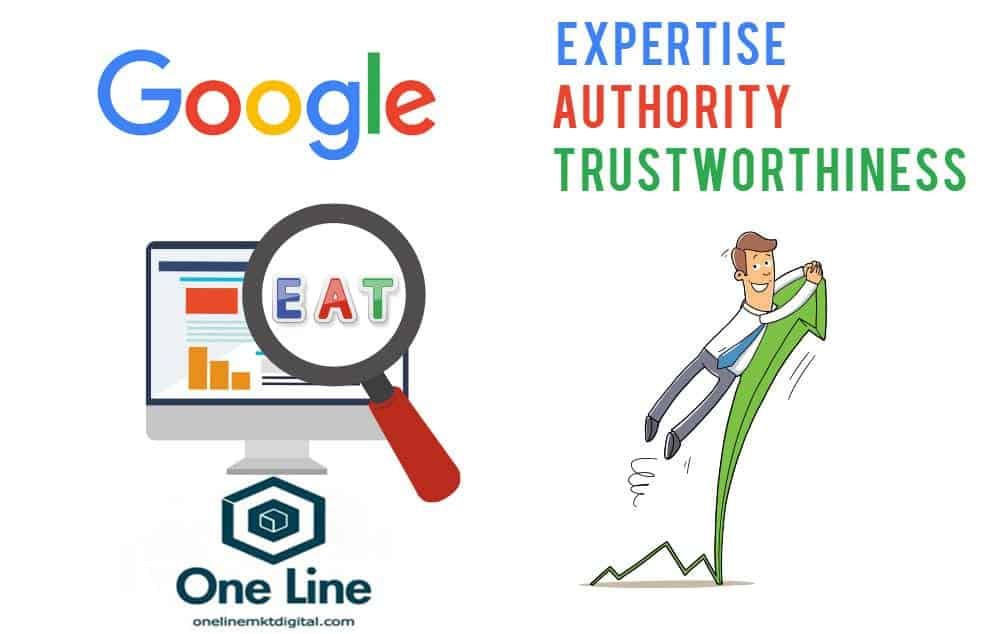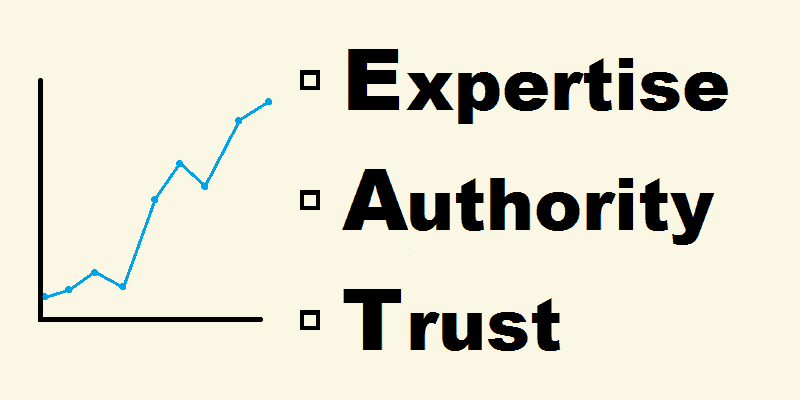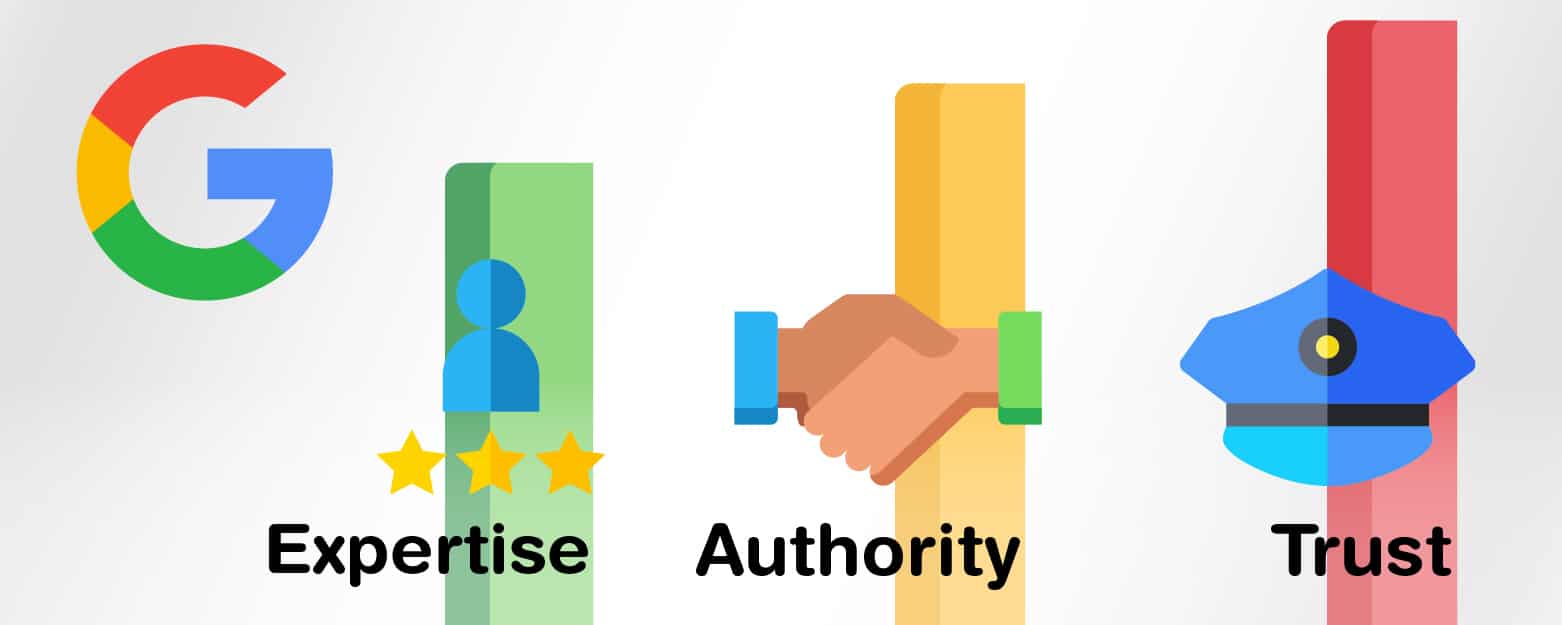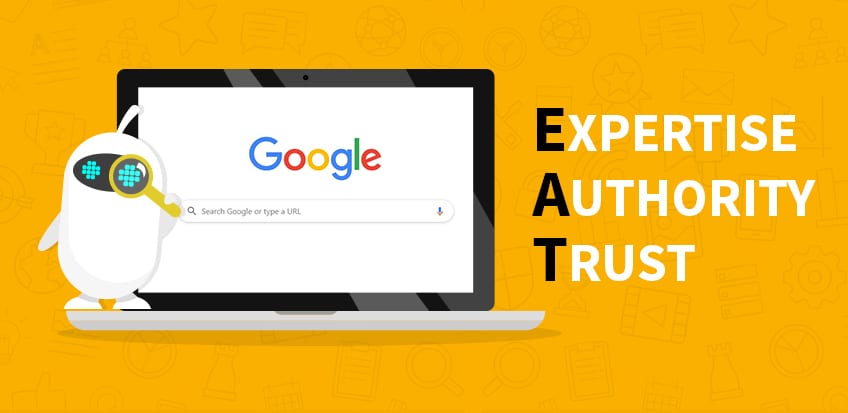
EAT SEO; sus pautas y para qué sirve
Seguramente habrás escuchado que cada página web de calidad debe tener un alto nivel de Experiencia, Autoridad y Confiabilidad. Al menos esto es lo que dicen las pautas EAT SEO de Google.
Pero, ¿es realmente así? ¿crees que la optimización de tus páginas web ayudará a mejorar la clasificación en los resultados de búsqueda?
Para disipar cualquier duda, he reunido todo lo que necesitamos saber sobre el EAT SEO, al menos lo más relevante del 2020, y si debemos o no, optimizar nuestras páginas web para ello.
Posiblemente, hayas oído hablar de E-A-T. Es un estándar que apareció de la nada y se convirtió en uno de los indicadores de SEO más populares de los últimos dos años. Y lo curioso es que, a pesar de recoger los principales factores para posicionar las páginas web en los primeros puestos de Google, casi nadie ha escuchado hablar sobre el E-A-T directamente, sobre lo que es y si realmente importa.
¿Qué es E-A-T?
Viene del inglés Expertise, Authoritativeness y Trustworthiness, es decir, Experiencia, Autoridad y Confianza. Estos son los criterios que Google considera indicativos de la calidad de las páginas web. Esos y otros factores se mencionan con frecuencia en la Guía Evaluadores de Calidad: que recoge las instrucciones dadas a los evaluadores humanos para otorgar una calidad a los resultados de búsqueda.
Se dice que E-A-T es importante para el contenido, pero especialmente aquel contenido que tiene el potencial de impactar en la felicidad, la salud, la estabilidad financiera o la seguridad de una persona. Google llama a esas páginas YMYL “Your money or your life” o lo que es lo mismo «Su dinero o su vida».
¿Qué es el YMYL?
Las páginas webs con contenido especialmente delicado por sus servicios o funcionalidades. O sea, que todo lo que influya directamente en el dinero de la gente y en su salud es de especial atención para Google. Por eso, podemos encontrar los siguientes tipos de contenidos web dentro de esta clasificación:
- Contenido que ofrece consejo legal o financiero.
- Contenido sobre salud o medicina que ofrece información sobre salud.
- Cualquier página que permita realizar transacciones e introducir tarjetas de crédito información bancaria.
- Páginas que solicitan información privada como ids, cuentas bancarias, permisos de conducción, etc.
- Contenido que ofrece cualquier tipo de consejo (compras de casas, padres, hijos, …)
¿Cómo evalúa las páginas web el E-A-T?
El EAT SEO da instrucciones para explorar el contenido de la página web en sí, así como la información disponible en otros lugares del sitio web y en la web en general. Hay alrededor de una docena de señales de calidad que deben buscar, pero no todas esas señales están presentes para todo tipo de contenido, por lo que los evaluadores a menudo se ven obligados a emitir un juicio sobre la calificación final E-A-T.
Evaluación de la Experiencia
El contenido debe ser producido por un individuo o una organización con experiencia, educación u otras calificaciones relevantes para el tema del contenido. Es importante destacar que no todos los tipos de contenido requieren experiencia formal: para las páginas que no son YMYL, la experiencia de vida puede ser suficiente. El ejemplo, puede ser el contenido de páginas web de médicos especializados, que aportan su experiencia personal y asesoran ciertas pautas para mejorar nuestra salud.
Esta experiencia que aporta el autor del contenido es lo que buscan los usuarios. Sus credenciales, biografía, página propia del autor, número de artículos sobre este o temas similares, artículos en otros sitios web, o tal vez una parte del contenido que explica cómo el autor llegó a ser un experto en el tema.
A veces, la experiencia puede ser evidente por la calidad del contenido. Si se trata de una pieza detallada de longitud apropiada, con muchos ejemplos y referencias, los evaluadores pueden concluir que el contenido se crea con suficiente experiencia.
Evaluación de la Autoridad
Para que un contenido tenga autoridad, la experiencia del creador de contenido debe ser reconocida por otros en el mismo campo y por la audiencia en general. Es por eso que para evaluar la autoridad, los evaluadores deben mirar más allá del sitio web donde se encuentra el contenido.
El principal consejo que los evaluadores obtienen sobre la autoridad de evaluación es buscar en Google al autor o la organización, excluyendo las fuentes que mantiene el autor o la organización en cuestión. Las señales a buscar son premios, reseñas y calificaciones, opiniones de expertos y menciones de otras organizaciones. Wikipedia a menudo se cita como una fuente confiable de dicha información.
Evaluación de la Confianza
La confiabilidad es un concepto multifacético que incluye precisión objetiva de la información, transparencia sobre la organización detrás del sitio web y sus políticas, y la reputación del creador de contenido.
Para evaluar la confiabilidad, se ordena a los evaluadores que echen un vistazo al sitio web original y vean si tiene elementos como la descripción de la empresa, la página de términos y condiciones, la política de reembolso, la información de contacto y otras formalidades relevantes.
También es importante verificar si se puede confiar en el contenido en sí mismo: si los hechos son recientes, si las declaraciones de YMYL están respaldadas por referencias y si el contenido está alineado con el consenso científico.
¿El EAT SEO da calidad a la página y mejora su posicionamiento?
 Evaluar el EAT SEO es solo uno de los pasos para medir la calidad en una página web. Inicialmente, los evaluadores establecen el propósito de la página, después intentan determinar si se puede confiar en la página (EAT), luego examinan la calidad del contenido principal y, finalmente, verifican si la página proporciona una buena experiencia de usuario.
Evaluar el EAT SEO es solo uno de los pasos para medir la calidad en una página web. Inicialmente, los evaluadores establecen el propósito de la página, después intentan determinar si se puede confiar en la página (EAT), luego examinan la calidad del contenido principal y, finalmente, verifican si la página proporciona una buena experiencia de usuario.
¿Cuál es la línea de tiempo histórica de la EAT SEO?
El concepto de E-A-T había aparecido en 2013 y había llevado una existencia razonablemente notable hasta su repentino salto a la fama en 2018. Pero, en aras de ser exhaustivo, comencemos aún más atrás:
2005
Probablemente incluso desde 2003, hay rumores en la web sobre la organización de algún tipo de “Rater Hub” por parte de Google. Consistía en reclutar usuarios de Internet para trabajar como evaluadores de calidad y revisar su índice de búsqueda.
2008
Las instrucciones dadas a los evaluadores de calidad se filtran por primera vez y, aunque son perspicaces, contienen sólo los parámetros de calidad de página más básicas que tienen que ver principalmente con la relevancia del contenido.
2013
Después de varias filtraciones posteriores, Google finalmente decide hacer públicas las directrices, excepto que resulta que la versión pública es mucho más corta que la filtrada. Este es también el año en que el documento menciona por primera vez E-A-T.
2015
Google finalmente lanza al público la versión completa de las pautas y, a partir de este momento, los SEO son plenamente conscientes de E-A-T, pero aún no es tan preocupante como lo es hoy.
2018
El 1 de agosto, Google lanza una importante actualización de algoritmo, y en toda la web, el tráfico orgánico se vuelve loco. Los expertos en SEO se apresuran a encontrar la solución y restaurar sus clasificaciones. Le molestan a Google sin descanso, pero Google insiste en que esta es una actualización amplia y que no hay nada específico que corregir.
En los primeros días de la actualización, parecía que los sitios web médicos se veían afectados de manera desproporcionada, y se comprueba que en las pautas de los evaluadores, los sitios web médicos se mencionan específicamente como los que tienen el más alto nivel de calidad. Por lo tanto, era fácil suponer que la actualización y las directrices estaban directamente conectadas.
Fue entonces cuando los expertos en SEO comenzaron a extraer las pautas de los evaluadores para obtener soluciones procesables y, aunque las pautas contenían docenas de métricas de calidad de página, han aterrizado específicamente en E-A-T. Y tenía sentido, porque antes de eso nadie realmente prestaba atención a E-A-T, por lo que era un área de las pautas donde los SEO podían ver el mayor margen de mejora.
A partir de ese momento, E-A-T había ganado popularidad en la comunidad de SEO, donde ahora se predica tanto como una forma de recuperarse de la actualización de agosto y una forma de obtener mejores clasificaciones en general.
¿EAT SEO es realmente importante para el posicionamiento web?
Si y no. El concepto de EAT SEO incluye más de una docena de factores que realmente mejorarían la calidad de la página, pero solo según lo perciben los evaluadores de calidad humana y los usuarios en general. Nunca ha habido ninguna prueba de que E-A-T pueda medirse algorítmicamente.
Además, los representantes de Google han confirmado, en varios puntos, que no pueden rastrear varias señales individuales que se consideran parte de E-A-T:
No se considera que las pautas del evaluador de calidad puedan ser algo que nuestros algoritmos están analizando explícitamente, verificando la reputación de los autores y luego usándola para clasificar sus sitios web.
¿Qué problemas presenta el EAT SEO?
Existen varios tipos de problemas con respecto a algunas de estas fuentes de información sobre una empresa, sobre un sitio web, y debemos asegurarnos de que realmente reflejamos lo que creemos que es realmente relevante para los usuarios en lugar de depender ciegamente de algún tercero.
Sobre la verificación de hechos, se dice en un documento técnico de Google sobre la lucha contra la desinformación:
“Nuestro sistema de clasificación no identifica la intención o la precisión de los hechos de ninguna pieza de contenido”
La frescura siempre es interesante porque es algo natural… no siempre la usamos porque a veces no tiene sentido mostrarle a la gente cierto contenido sobre investigaciones a largo plazo. A veces, solo tenemos contenido que nos parece irrelevante.
Lo divertido es encontrarnos a un SEO que decía: «Ok, vemos muchos “Me gusta” en Facebook, y esas son las páginas que se clasifican bien…». Pero eso es correlación, no es causalidad. En cambio, es probable que haya algo realmente interesante, y debido a que hay algo interesante, entonces recibe muchos “Me gusta” en Facebook, y mucha gente decide vincularlo. Ese es el tipo de cosas en las que cuanto mejor contenido hagas, a más personas les va a gustar no solo en Google sino también en Twitter y Facebook.



